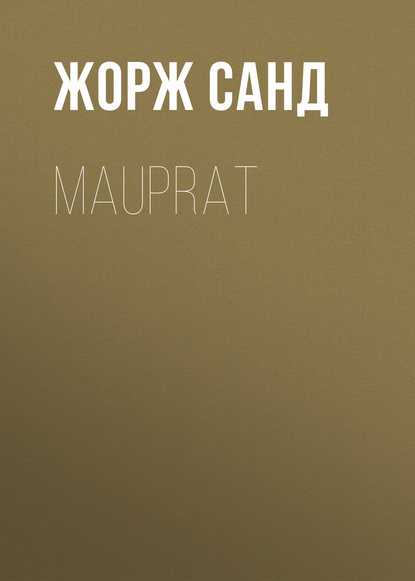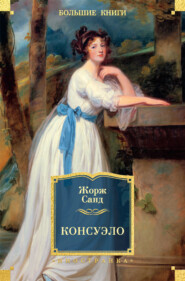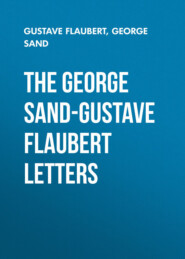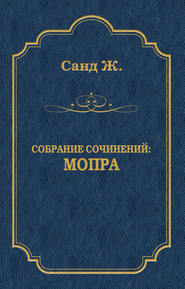По всем вопросам обращайтесь на: info@litportal.ru
(©) 2003-2025.
✖
Mauprat
Настройки чтения
Размер шрифта
Высота строк
Поля
There used to be an elder and a younger branch of the Mauprats. I belong to the elder. My grandfather was that old Tristan de Mauprat who ran through his fortune, dishonoured his name, and was such a blackguard that his memory is already surrounded by a halo of the marvelous. The peasants still believe that his ghost appears, either in the body of a wizard who shows malefactors the way to the dwellings of Varenne, or in that of an old white hare which reveals itself to people meditating some evil deed. When I came into the world the only living member of the younger branch was Monsieur Hubert de Mauprat, known as the chevalier, because he belonged to the Order of the Knights of Malta; a man just as good as his cousin was bad. Being the youngest son of his family, he had taken the vow of celibacy; but, when he found himself the sole survivor of several brothers and sisters, he obtained release from his vow, and took a wife the year before I was born. Rumour says that before changing his existence in this way he made strenuous efforts to find some descendant of the elder branch worthy to restore the tarnished family name, and preserve the fortune which had accumulated in the hands of the younger branch. He had endeavoured to put his cousin Tristan’s affairs in order, and had frequently paid off the latter’s creditors. Seeing, however, that the only effect of his kindness was to encourage the vices of the family, and that, instead of respect and gratitude, he received nothing but secret hatred and churlish jealousy, he abandoned all attempts at friendship, broke with his cousins, and in spite of his advanced age (he was over sixty), took a wife in order to have heirs of his own. He had one daughter, and there his hopes of posterity ended; for soon afterward his wife died of a violent illness which the doctors called iliac passion. He then left that part of the country and returned but rarely to his estates. These were situated about six leagues from Roche-Mauprat, on the borders of the Varenne du Fromental. He was a prudent man and a just, because he was cultured, because his father had moved with the spirit of his century, and had had him educated. None the less he had preserved a firm character and an enterprising mind, and, like his ancestors, he was proud of hearing as a sort of surname the knightly title of Headbreaker, hereditary in the original Mauprat stock. As for the elder branch, it had turned out so badly, or rather had preserved from the old feudal days such terrible habits of brigandage, that it had won for itself the distinctive title of Hamstringer. [I hazard “Headbreaker” and “Hamstringer” as poor equivalents for the “Casse-Tete” and “Coupe-Jarret” of the French. – TR.] Of the sons of Tristan, my father, the eldest, was the only one who married. I was his only child. Here it is necessary to mention a fact of which I was long ignorant. Hubert de Mauprat, on hearing of my birth, begged me of my parents, undertaking to make me his heir if he were allowed absolute control over my education. At a shooting-party about this time my father was killed by an accidental shot, and my grandfather refused the chevalier’s offer, declaring that his children were the sole legitimate heirs of the younger branch, and that consequently he would resist with all his might any substitution in my favour. It was then that Hubert’s daughter was born. But when, seven years later, his wife died leaving him this one child, the desire, so strong in the nobles of that time, to perpetuate their name, urged him to renew his request to my mother. What her answer was I do not know; she fell ill and died. The country doctors again brought in a verdict of iliac passion. My grandfather had spent the last two days she passed in this world with her.
Pour me out a glass of Spanish wine; for I feel a cold shiver running through my body. It is nothing serious – merely the effect that these early recollections have on me when I begin to narrate them. It will soon pass off.
He swallowed a large glass of wine, and we did the same; for a sensation of cold came upon us too as we gazed at his stern face and listened to his brief, abrupt sentences. He continued:
Thus at the age of seven I found myself an orphan. My grandfather searched my mother’s house and seized all the money and valuables he could carry away. Then, leaving the rest, and declaring he would have nothing to do with lawyers, he did not even wait for the funeral, but took me by the collar and flung me on to the crupper of his horse, saying: “Now, my young ward, come home with me; and try to stop that crying soon, for I haven’t much patience with brats.” In fact, after a few seconds he gave me such hard cuts with his whip that I stopped crying, and, withdrawing myself like a tortoise into my shell, completed the journey without daring to breathe.
He was a tall old man, bony and cross-eyed. I fancy I see him now as he was then. The impression that evening made on me can never be effaced. It was a sudden realization of all the horrors which my mother had foreshadowed when speaking of her execrable father-in-law and his brigands of sons. The moon, I remember, was shining here and there through the dense foliage of the forest. My grandfather’s horse was lean, hardy, and bad-tempered like himself. It kicked at every cut of the whip, and its master gave it plenty. Swift as an arrow it jumped the ravines and little torrents which everywhere intersect Varenne in all directions. At each jump I lost my balance, and clung in terror to the saddle or my grandfather’s coat. As for him, he was so little concerned about me that, had I fallen, I doubt whether he would have taken the trouble to pick me up. Sometimes, noticing my terror, he would jeer at me, and, to make me still more afraid, set his horse plunging again. Twenty times, in a frenzy of despair, I was on the point of throwing myself off; but the instinctive love of life prevented me from giving way to the impulse. At last, about midnight, we suddenly stopped before a small pointed gate, and the drawbridge was soon lifted behind us. My grandfather took me, bathed in a cold sweat as I was, and threw me over to a great fellow, lame and horribly ugly, who carried me into the house. This was my Uncle John, and I was at Roche-Mauprat.
At that time my grandfather, along with his eight sons, formed the last relic in our province of that race of petty feudal tyrants by which France had been overrun and harassed for so many centuries. Civilization, already advancing rapidly towards the great convulsion of the Revolution, was gradually stamping out the systematic extortions of these robbers. The light of education, a species of good taste reflected, however dimly, from a polished court, and perhaps a presentiment of the impending terrible awakening of the people, were spreading through the castles and even through the half-rustic manors of the lordlings. Ever in our midland provinces, the most backward by reason of their situation, the sentiment of social equality was already driving out the customs of a barbarous age. More than one vile scapegrace had been forced to reform, in spite of his privileges; and in certain places where the peasants, driven to desperation, had rid themselves of their overlord, the law had not dreamt of interfering, nor had the relatives dared to demand redress.
In spite of the prevailing tone of mind, my grandfather had long maintained his position in the country without experiencing any opposition. But, having had a large family, endowed like himself with a goodly number of vices, he finally found himself pestered and besieged by creditors who, instead of being frightened by his threats, as of old, were themselves threatening to make him suffer. He was obliged to devise some means of avoiding the bailiffs on the one hand, and, on the other, the fights which were continually taking place. In these fights the Mauprats no longer shone, despite their numbers, their complete union, and their herculean strength; since the whole population of the district sided with their opponents and took upon itself the duty of stoning them. So, rallying his progeny around him, as the wild boar gathers together its young after a hunt, Tristan withdrew into his castle and ordered the drawbridge to be raised. Shut up with him were ten or twelve peasants, his servants, all of them poachers or refugees, who like himself had some interest in “retiring from the world” (his own expression), and in finding a place of safety behind good stout walls. An enormous pile of hunting weapons, duck-guns, carbines, blunderbusses, spears, and cutlasses, were raised on the platform, and the porter received orders never to let more than two persons at a time approach within range of his gun.
From that day Mauprat and his sons broke with all civil laws as they had already broken with all moral laws. They formed themselves into a band of adventurers. While their well-beloved and trusty poachers supplied the house with game, they levied illegal taxes on the small farms in the neighbourhood. Now, without being cowards (and they are far from that), the peasants of our province, as you know, are meek and timid, partly from listlessness, partly from distrust of the law, which they have never understood, and of which even to this day they have but a scanty knowledge. No province of France has preserved more old traditions or longer endured the abuses of feudalism. Nowhere else, perhaps, has the title of the lord of the manor been handed down, as hitherto with us, to the owners of certain estates; and nowhere is it so easy to frighten the people with reports of some absurd and impossible political event. At the time of which I speak the Mauprats, being the only powerful family in a district remote from towns and cut off from communication with the outside world, had little difficulty in persuading their vassals that serfdom was about to be re-established, and that it would go hard with all who resisted. The peasants hesitated, listened timorously to the few among themselves who preached independence, then thought the matter over and decided to submit. The Mauprats were clever enough not to demand money of them, for money is what the peasant in such a district obtains with the greatest difficulty, and parts from with the greatest reluctance. “Money is dear,” is one of his proverbs, because in his eyes money stands for something different from manual labour. It means traffic with men and things outside his world, an effort of foresight or circumspection, a bargain, a sort of intellectual struggle, which lifts him out of his ordinary heedless habits; it means, in a word, mental labour, and this for him is the most painful and the most wearing.
The Mauprats, knowing how the ground lay, and having no particular need of money any longer, since they had repudiated their debts, demanded payments in kind only. They ruled that one man should contribute capons, another calves, a third corn, a fourth fodder, and so on. They were careful, too, to tax judiciously, to demand from each the commodity he could provide with least inconvenience to himself. In return they promised help and protection to all; and up to a certain point they kept their word. They cleared the land of wolves and foxes, gave a welcome and a hiding-place to all deserters, and helped to defraud the state by intimidating the excise officers and tax-collectors.
They took advantage of their power to give the poor man a false notion of his real interests, and to corrupt the simple folk by undermining all sense of their dignity and natural liberty. They made the whole district combine in a sort of secession from the law, and they so frightened the functionaries appointed to enforce respect for it, that after a few years it fell into a veritable desuetude. Thus it happened that, while France at a short distance from this region was advancing with rapid strides towards the enfranchisement of the poorer classes, Varenne was executing a retrograde march and returning at full speed to the ancient tyranny of the country squires. It was easy enough for the Mauprats to pervert these poor folk; they feigned a friendly interest in them to mark their difference from the other nobles in the province whose manners still retained some of the haughtiness of their ancient power. Above all, my grandfather lost no opportunity of making the peasants share his own hatred of his own cousin, Hubert de Mauprat. The latter, whenever he interviewed his vassals, would remain seated in his arm-chair, while they stood before him bareheaded; whereas Tristan de Mauprat would make them sit down at his table, and drink some of the wine they had brought him as a sign of voluntary homage. He would then have them led home by his men in the middle of the night, all dead drunk, torches in hand, and making the forest resound with ribald songs. Libertinism completed the demoralization of the peasantry. In every family the Mauprats soon had their mistresses. This was tolerated, partly because it was profitable, and partly (alas! that it should have to be said) because it gratified vanity. The very isolation of the houses was favourable to the evil. No scandal, no denunciation were to be feared. The tiniest village would have been sufficient for the creation and maintenance of a public opinion. There, however, there were only scattered cottages and isolated farms; wastes and woods so separated the families from one another that the exercise of any mutual control was impossible. Shame is stronger than conscience. I need not tell you of all the bonds of infamy that united masters and slaves. Debauchery, extortion, and fraud were both precept and example for my youth, and life went on merrily. All notions of justice were scoffed at; creditors were defrauded of both interest and capital; any law officer who ventured to serve a summons received a sound thrashing, and the mounted police were fired on if they approached too near the turrets. A plague on parliament; starvation to all imbued with the new philosophy; and death to the younger branch of the Mauprats – such were the watchwords of these men who, to crown all, gave themselves the airs of knights-errant of the twelfth century. My grandfather talked of nothing but his pedigree and the prowess of his ancestors. He regretted the good old days when every lordling had instruments of torture in his manor, and dungeons, and, best, of all cannon. In ours we only had pitchforks and sticks, and a second-rate culverin which my Uncle John used to point – and point very well, in fact – and which was sufficient to keep at a respectful distance the military force of the district.
II
Old Mauprat was a treacherous animal of the carnivorous order, a cross between a lynx and a fox. Along with a copious and easy flow of language, he had a veneer of education which helped his cunning. He made a point of excessive politeness, and had great powers of persuasion, even with the objects of his vengeance. He knew how to entice them to his castle, where he would make them undergo frightful ill-treatment, for which, however, having no witnesses, they were unable to obtain redress by law. All his villainies bore the stamp of such consummate skill that the country came to view them with a sort of awe akin to respect. No one could ever catch him out of his den, though he issued forth often enough, and apparently without taking many precautions. In truth, he was a man with a genius for evil; and his sons, bound to him by no ties of affection, of which, indeed, they were incapable, yet acknowledged the sway of this superior evil genius, and gave him a uniform and ready obedience, in which there was something almost fanatic. He was their deliverer in all desperate cases; and when the weariness of confinement under our chilly vaults began to fill them with ennui, his mind, brutal even in jest, would cure them by arranging for their pleasure shows worthy of a den of thieves. Sometimes poor mendicant monks collecting alms would be terrified or tortured for their benefit; their beards would be burned off, or they would be lowered into a well and kept hanging between life and death until they had sung some foul song or uttered some blasphemy. Everybody knows the story of the notary who was allowed to enter in company with his four clerks, and whom they received with all the assiduity of pompous hospitality. My grandfather pretended to agree with a good grace to the execution of their warrant, and politely helped them to make an inventory of his furniture, of which the sale had been decreed. After this, when dinner was served and the king’s men had taken their places at table, he said to the notary:
“Ah, mon Dieu! I was forgetting a poor hack of mine in the stable. It’s a small matter. Still, you might be reprimanded for omitting it; and as I see that you are a worthy fellow I should be sorry to mislead you. Come with me and see it; it won’t take us a moment.”
The notary followed Mauprat unsuspectingly. Just as they were about to enter the stable together, Mauprat, who was leading the way, told him to put in his head only. The notary, anxious to show great consideration in the performance of his duties, and not to pry into things too closely, did as he was told. Then Mauprat suddenly pushed the door to and squeezed his neck so violently between it and the wall that the wretched man could not breathe. Deeming him sufficiently punished, Tristan opened the door again, and, asking pardon for his carelessness, with great civility offered the man his arm to take him back to dinner. This the notary did not consider it wise to refuse; but as soon as he re-entered the room where his colleagues were, he threw himself into a chair, and pointing to his livid face and mangled neck, demanded justice for the trap into which he had just been led. It was then that my grandfather, revelling in his rascally wit, went through a comedy scene of sublime audacity. He gravely reproached the notary with accusing him unjustly, and always addressing him kindly and with studied politeness, called the others to bear witness to his conduct, begging them to make allowances if his precarious position had forced him to give them such a poor reception, all the while doing the honours of the table in splendid style. The poor notary did not dare to press the matter and was compelled to dine, although half dead. His companions were so completely duped by Mauprat’s assurance that they ate and drank merrily, treating the notary as a lunatic and a boor. They left Roche-Mauprat all drunk, singing the praises of their host, and laughing at the notary, who fell down dead upon the threshold of his house on dismounting from his horse.
The eight sons, the pride and strength of old Mauprat, all resembled him in physical vigour, brutality of manners, and, to some extent, in craftiness and jesting ill-nature. The truth is they were veritable brutes, capable of any evil, and completely dead to any noble thought or generous sentiment. Nevertheless, they were endowed with a sort of reckless, dashing courage which now and then seemed to have in it an element of grandeur. But it is time that I told you about myself, and gave you some idea of the development of my character in the thick of this filthy mire into which it had pleased God to plunge me, on leaving my cradle.
I should be wrong if, in order to gain your sympathy in these early years of my life, I asserted that I was born with a noble nature, a pure and incorruptible soul. As to this, I know nothing. Maybe there are no incorruptible souls. Maybe there are. That is what neither you nor any one will ever know. The great questions awaiting an answer are these: “Are our innate tendencies invincible? If not, can they be modified merely or wholly destroyed by education?” For myself, I would not dare to affirm. I am neither a metaphysician, nor a psychologist, nor a philosopher; but I have had a terrible life, gentlemen, and if I were a legislator, I would order that man to have his tongue torn out, or his head cut off, who dared to preach or write that the nature of individuals is unchangeable, and that it is no more possible to reform the character of a man than the appetite of a tiger. God has preserved me from believing this.
All I can tell you is that my mother instilled into me good principles, though, perhaps, I was not endowed by nature with her good qualities. Even with her I was of a violent disposition, but my violence was sullen and suppressed. I was blind and brutal in anger, nervous even to cowardice at the approach of danger, daring almost to foolhardiness when hand to hand with it – that is to say, at once timid and brave from my love of life. My obstinacy was revolting; yet my mother alone could conquer me; and without attempting to reason, for my mind developed very slowly, I used to obey her as if by a sort of magnetic necessity. This one guiding hand which I remember, and another woman’s which I felt later, were and have been sufficient to lead me towards good. But I lost my mother before she had been able to teach me anything seriously; and when I was transplanted to Roche-Mauprat, my feeling for the evil done there was merely an instinctive aversion, feeble enough, perhaps, if fear had not been mingled with it.
But I thank Heaven from the bottom of my heart for the cruelties heaped upon me there, and above all for the hatred which my Uncle John conceived for me. My ill-fortune preserved me from indifference in the presence of evil, and my sufferings helped me to detest those who wrought it.
This John was certainly the most detestable of his race. Ever since a fall from his horse had maimed him, his evil temper had developed in proportion to his inability to do as much harm as his companions. Compelled to remain at home when the others set out on their expeditions, for he could not bestride a horse, he found his only chance of pleasure in those fruitless little attacks which the mounted police sometimes made on the castle, as if to ease their conscience. Then, intrenched behind a rampart of freestone which he had had built to suit himself, John, calmly seated near his culverin, would pick off a gentleman from time to time, and at once regain, as he said, his sleeping and eating power, which want of exercise had taken from him. And he would even climb up to his beloved platform without waiting for the excuse of an attack, and there, crouching down like a cat ready to spring, as soon as he saw any one appear in the distance without giving the signal, he would try his skill upon the target, and make the man retrace his steps. This he called sweeping the path clean.
As I was too young to accompany my uncles on their hunting and plundering expeditions, John naturally became my guardian and tutor – that is to say, my jailor and tormentor. I will not give you all the details of that infernal existence. For nearly ten years I endured cold, hunger, insults, the dungeon, and blows, according to the more or less savage caprices of this monster. His fierce hatred of me arose from the fact that he could not succeed in depraving me; my rugged, headstrong, and unsociable nature preserved me from his vile seductions. It is possible that I had not any strong tendencies to virtue; to hatred I luckily had. Rather than do the bidding of my tyrant I would have suffered a thousand deaths. And so I grew up without conceiving any affection for vice. However, my notions about society were so strange that my uncles’ mode of life did not in itself cause me any repugnance. Seeing that I was brought up behind the walls of Roche-Mauprat, and that I lived in a state of perpetual siege, you will understand that I had precisely such ideas as any armed retainer in the barbarous ages of feudalism might have had. What, outside our den, was termed by other men assassinating, plundering, and torturing, I was taught to call fighting, conquering, and subduing. My sole knowledge of history consisted of an acquaintance with certain legends and ballads of chivalry which my grandfather used to repeat to me of an evening, when he had time to think of what he was pleased to call my education. Whenever I asked him any question about the present time, he used to answer that times had sadly changed, that all Frenchmen had become traitors and felons, that they had frightened their kings, and that these, like cravens, had deserted the nobles, who in their turn had been cowardly enough to renounce their privileges and let laws be made for them by clodhoppers. I listened with surprise, almost with indignation, to this account of the age in which I lived, for me an age of shadows and mysteries. My grandfather had but vague ideas of chronology; not a book of any kind was to be found at Roche-Mauprat, except, I should say, the History of the Sons of Aymon, and a few chronicles of the same class brought by our servants from country fairs. Three names, and only three, stood clear in the chaos of my ignorance – Charlemagne, Louis XI, and Louis XIV; because my grandfather would frequently introduce these into dissertations on the unrecognised rights of the nobles. In truth, I was so ignorant that I scarcely knew the difference between a reign and a race; and I was by no means sure that my grandfather had not seen Charlemagne, for he spoke of him more frequently and more gladly than of any other man.
But, while my native energy led me to admire the exploits of my uncles, and filled me with a longing to share in them, the cold-blooded cruelty they perpetrated on returning from their expeditions, and the perfidious artifices by which they lured their dupes to the castle, in order to torture them to extort ransom, roused in me strange and painful emotions, which, now that I am speaking in all sincerity, it would be difficult for me to account for exactly. In the absence of all ordinary moral principles it might have been natural for me to accept the theory which I daily saw carried into practice, that makes it right; but the humiliation and suffering which my Uncle John inflicted on me in virtue of this theory, taught me to be dissatisfied with it. I could appreciate the right of the bravest, and I genuinely despised those who, with death in their power, yet chose life at the price of such ignominy as they had to bear at Roche-Mauprat. But I could only explain these insults and horrors heaped on prisoners, some of them women and mere children, as manifestations of bloodthirsty appetites. I do not know if I was sufficiently susceptible of a noble sentiment to be inspired with pity for the victim; but certain it is that I experienced that feeling of selfish commiseration which is common to all natures, and which, purified and ennobled, has become charity among civilized peoples. Under my coarse exterior my heart no doubt merely felt passing shocks of fear and disgust at the sight of punishments which I myself might have to endure any day at the caprice of my oppressors; especially as John, when he saw me turn pale at these frightful spectacles, had a habit of saying, in a mocking tone:
“That’s what I’ll do to you when you are disobedient.”
All I know is that in presence of such iniquitous acts I experienced a horrible uneasiness; my blood curdled in my veins, my throat began to close, and I had to rush away, so as not to repeat the cries which pierced my ears. In time, however, I became somewhat hardened to these terrible impressions. The fibres of feeling grew tougher, and habit gave me power to hide what they termed my cowardice. I even felt ashamed of the signs of weakness I showed, and forced my face into the hyena smile which I saw on the faces of my kinsmen. But I could never prevent convulsive shudders from running through my limbs, and the coldness as of death from falling on my heart, at the recollection of these scenes of agony. The women, dragged half-willingly, half by force, under the roof of Roche-Mauprat, caused me inconceivable agitation. I began to feel the fires of youth kindling within me, and even to look with envy on this part of my uncles’ spoil; but with these new-born desires were mingled inexpressible pangs. To all around me women were merely objects of contempt, and vainly did I try to separate this idea from that of the pleasure which was luring me. My mind was bewildered, and my irritated nerves imparted a violent and sickly strain to all my temptations. In other matters, I had as vile a disposition as my companions; if my heart was better than theirs, my manners were no less arrogant, and my jokes in no better taste. And here it may be well to give you an illustration of my youthful malice, especially as the results of these events have had an influence on the rest of my life.
III
Some three leagues from Roche-Mauprat, on your way to Fromental, you must have noticed an old tower standing by itself in the middle of the woods. It is famous for the tragic death of a prisoner about a century ago. The executioner, on his rounds, thought good to hang him without any further formality, merely to gratify an old Mauprat, his overlord.
At the time of which I am speaking Gazeau Tower was already deserted and falling into ruins. It was state property, and, more from negligence than kindness, the authorities had allowed a poor old fellow to take up his abode there. He was quite a character, used to live completely alone, and was known in the district as Gaffer Patience.
“Yes,” I interrupted; “I have heard my nurse’s grandmother speak of him; she believed he was a sorcerer.”
Exactly so; and while we are at this point let me tell you what sort of a man this Patience really was, for I shall have to speak of him more than once in the course of my story. I had opportunities of studying him thoroughly.
Patience, then, was a rustic philosopher. Heaven had endowed him with a keen intellect, but he had had little education. By a sort of strange fatality, his brain had doggedly resisted the little instruction he might have received. For instance, he had been to the Carmelite’s school at – , and instead of showing any aptitude for work, he had played truant with a keener delight than any of his school-fellows. His was an eminently contemplative nature, kindly and indolent, but proud and almost savage in its love of independence; religious, yet opposed to all authority; somewhat captious, very suspicious, and inexorable with hypocrites. The observances of the cloister inspired him with but little awe; and as a result of once or twice speaking his mind too freely to the monks he was expelled from the school. From that time forth he was the sworn foe of what he called monkism, and declared openly for the cure of the Briantes, who was accused of being a Jansenist. In the instruction of Patience, however, the cure succeeded no better than the monks. The young peasant, endowed though he was with herculean strength and a great desire for knowledge, displayed an unconquerable aversion for every kind of work, whether physical or mental. He professed a sort of artless philosophy which the cure found it very difficult to argue against. There was, he said, no need for a man to work as long as he did not want money; and he was in no need of money as long as his wants were moderate. Patience practised what he preached: during the years when passions are so powerful he lived a life of austerity, drank nothing but water, never entered a tavern, and never joined in a dance. He was always very awkward and shy with women, who, it must be owned, found little to please in his eccentric character, stern face, and somewhat sarcastic wit. As if to avenge himself for this by showing his contempt, or to console himself by displaying his wisdom, he took a pleasure, like Diogenes of old, in decrying the vain pleasures of others; and if at times he was to be seen passing under the branches in the middle of the fetes, it was merely to throw out some shaft of scorn, a flash from his inexorable good sense. Sometimes, too, his uncompromising morality found expression in biting words, which left clouds of sadness or fear hanging over agitated consciences. This naturally gained him violent enemies; and the efforts of impotent hatred, helped by the feeling of awe which his eccentric behaviour produced, fastened upon him the reputation of a sorcerer.
When I said that Patience was lacking in education, I expressed myself badly. Longing for a knowledge of the sublime mysteries of Nature, his mind wished to soar to heaven on its first flight. From the very beginning, the Jansenist vicar was so perplexed and startled by the audacity of his pupil, he had to say so much to calm him into submission, he was obliged to sustain such assaults of bold questions and proud objections, that he had no leisure to teach him the alphabet; and at the end of ten years of studies, broken off and taken up at the bidding of a whim or on compulsion, Patience could not even read. It was only with great difficulty, after poring over a book for some two hours, that he deciphered a single page, and even then he did not grasp the meaning of most of the words expressing abstract ideas. Yet these abstract ideas were undoubtedly in him; you felt their presence while watching and listening to him; and the way in which he managed to embody them in homely phrase enlivened with a rude poetry was so marvellous, that one scarcely knew whether to feel astounded or amused.
Always serious, always positive himself, he scorned dalliance with any dialectic. A Stoic by nature and on principle, enthusiastic in the propagation of his doctrine of severance from false ideas, but resolute in the practice of resignation, he made many a breach in the poor cure’s defences; and it was in these discussions, as he often told me in his last years, that he acquired his knowledge of philosophy. In order to make a stand against the battering-ram of natural logic, the worthy Jansenist was obliged to invoke the testimony of all the Fathers of the Church, and to oppose these, often even to corroborate them, with the teaching of all the sages and scholars of antiquity. Then Patience, his round eyes starting from his head (this was his own expression), lapsed into silence, and, delighted to learn without having the bother of studying, would ask for long explanations of the doctrines of these men, and for an account of their lives. Noticing this attention and this silence, his adversary would exult; but just as he thought he had convinced this rebellious soul, Patience, hearing the village clock strike midnight, would rise, take an affectionate leave of his host, and on the very threshold of the vicarage, would dismay the good man with some laconic and cutting comment that confounded Saint Jerome and Plato alike, Eusebius equally with Seneca, Tertullian no less than Aristotle.
The cure was not too ready to acknowledge the superiority of this untutored intellect. Still, he was quite astonished at passing so many winter evenings by his fireside with this peasant without feeling either bored or tired; and he would wonder how it was that the village schoolmaster, and even the prior of the convent, in spite of their Greek and Latin, appeared to him, the one a bore, the other a sophist, in all their discussions. Knowing the perfect purity of the peasant’s life, he attributed the ascendency of his mind to the power of virtue and the charm it spreads over all things. Then, each evening, he would humbly accuse himself before God of not having disputed with his pupil from a sufficiently Christian point of view; he would confess to his guardian angel that pride in his own learning and joy at being listened to so devoutly had carried him somewhat beyond the bounds of religious instruction; that he had quoted profane writers too complacently; that he had even experienced a dangerous pleasure in roaming with his disciple through the fields of the past, plucking pagan flowers unsprinkled by the waters of baptism, flowers in whose fragrance a priest should not have found such delight.
On his side, Patience loved the cure dearly. He was his only friend, his only bond of union with society, his only bond of union, through the light of knowledge, with God. The peasant largely over-estimated his pastor’s learning. He did not know that even the most enlightened men often draw wrong conclusions, or no conclusions at all, from the course of progress. Patience would have been spared great distress of mind if he could have seen for certain that his master was frequently mistaken and that it was the man, not the truth, that was at fault. Not knowing this, and finding the experience of the ages at variance with his innate sense of justice, he was continually a prey to agonizing reveries; and, living by himself, and wandering through the country at all hours of the day and night, wrapped in thoughts undreamed of by his fellows, he gave more and more credit to the tales of sorcery reported against him.
The convent did not like the pastor. A few monks whom Patience had unmasked hated Patience. Hence, both pastor and pupil were persecuted. The ignorant monks did not scruple to accuse the cure to his bishop of devoting himself to the occult sciences in concert with the magician Patience. A sort of religious war broke out in the village and neighbourhood. All who were not for the convent were for the cure, and vice versa. Patience scorned to take part in this struggle. One morning he went to see his friend, with tears in his eyes, and said to him:
“You are the one man in all the world that I love, and I will not have you persecuted on my account. Since, after you, I neither know nor care for a soul, I am going off to live in the woods, like the men of primitive times. I have inherited a field which brings me in fifty francs a year. It is the only land I have ever stirred with these hands, and half its wretched rent has gone to pay the tithe of labour I owe the seignior. I trust to die without ever doing duty as a beast of burden for others. And yet, should they remove you from your office, or rob you of your income, if you have a field that needs ploughing, only send me word, and you will see that these arms have not grown altogether stiff in their idleness.”
It was in vain that the pastor opposed this resolve. Patience departed, carrying with him as his only belonging the coat he had on his back, and an abridgment of the teachings of Epictetus. For this book he had a great affection, and, thanks to much study of it, could read as many as three of its pages a day without unduly tiring himself. The rustic anchorite went into the desert to live. At first he built himself a hut of branches in a wood. Then, as wolves attacked him, he took refuge in one of the lower halls of Gazeau Tower, which he furnished luxuriously with a bed of moss, and some stumps of trees; wild roots, wild fruit, and goat’s milk constituted a daily fare very little inferior to what he had had in the village. This is no exaggeration. You have to see the peasants in certain parts of Varenne to form an idea of the frugal diet on which a man can live and keep in good health. In the midst of these men of stoical habits all round him, Patience was still exceptional. Never had wine reddened his lips, and bread had seemed to him a superfluity. Besides, the doctrine of Pythagoras was not wholly displeasing to him; and in the rare interviews which he henceforth had with his friend he would declare that, without exactly believing in metempsychosis, and without making it a rule to eat vegetables only, he felt a secret joy at being able to live thus, and at having no further occasion to see death dealt out every day to innocent animals.
Patience had formed this curious resolution at the age of forty. He was sixty when I saw him for the first time, and he was then possessed of extraordinary physical vigour. In truth, he was in the habit of roaming about the country every year. However, in proportion as I tell you about my own life, I shall give you details of the hermit life of Patience.
At the time of which I am about to speak, the forest rangers, more from fear of his casting a spell over them than out of compassion, had finally ceased their persecutions, and given him full permission to live in Gazeau Tower, not, however, without warning him that it would probably fall about his head during the first gale of wind. To this Patience had replied philosophically that if he was destined to be crushed to death, the first tree in the forest would do the work quite as well as the walls of Gazeau Tower.
Before putting my actor Patience on the stage, and with many apologies for inflicting on you such a long preliminary biography, I have still to mention that during the twenty years of which I have spoken the cure’s mind had bowed to a new power. He loved philosophy, and in spite of himself, dear man, could not prevent this love from embracing the philosophers too, even the least orthodox. The works of Jean Jacques Rousseau carried him away into new regions, in spite of all his efforts at resistance; and when one morning, when returning from a visit to some sick folk, he came across Patience gathering his dinner of herbs from the rocks of Crevant, he sat down near him on one of the druidical stones and made, without knowing it, the profession of faith of the Savoyard vicar. Patience drank more willingly of this poetic religion than of the ancient orthodoxy. The pleasure with which he listened to a summary of the new doctrines led the cure to arrange secret meetings with him in isolated parts of Varenne, where they agreed to come upon each other as if by chance. At these mysterious interviews the imagination of Patience, fresh and ardent from long solitude, was fired with all the magic of the thoughts and hopes which were then fermenting in France, from the court of Versailles to the most uninhabitable heath. He became enamoured of Jean Jacques, and made the cure read as much of him as he possibly could without neglecting his duties. Then he begged a copy of the Contrat Social, and hastened to Gazeau Tower to spell his way through it feverishly. At first the cure had given him of this manna only with a sparing hand, and while making him admire the lofty thoughts and noble sentiments of the philosopher, had thought to put him on his guard against the poison of anarchy. But all the old learning, all the happy texts of bygone days – in a word, all the theology of the worthy priest – was swept away like a fragile bridge by the torrent of wild eloquence and ungovernable enthusiasm which Patience had accumulated in his desert. The vicar had to give way and fall back terrified upon himself. There he discovered that the shrine of his own science was everywhere cracking and crumbling to ruin. The new sun which was rising on the political horizon and making havoc in so many minds, melted his own like a light snow under the first breath of spring. The sublime enthusiasm of Patience; the strange poetic life of the man which seemed to reveal him as one inspired; the romantic turn which their mysterious relations were taking (the ignoble persecutions of the convent making it noble to revolt) – all this so worked upon the priest that by 1770 he had already travelled far from Jansenism, and was vainly searching all the religious heresies for some spot on which he might rest before falling into the abyss of philosophy so often opened at his feet by Patience, so often hidden in vain by the exorcisms of Roman theology.
IV
After this account of the philosophical life of Patience, set forth by me now in manhood (continued Bernard, after a pause), it is not altogether easy to return to the very different impressions I received in boyhood on meeting the wizard of Gazeau Tower. I will make an effort, however, to reproduce my recollections faithfully.
It was one summer evening, as I was returning from bird-snaring with several peasant-boys, that I passed Gazeau Tower for the first time. My age was about thirteen, and I was bigger and stronger than any of my comrades; besides, I exercised over them, sternly enough, the authority I drew from my noble birth. In fact, the mixture of familiarity and etiquette in our intercourse was rather fantastic. Sometimes, when the excitement of sport or the fatigue of the day had greater powers over them than I, they used to have their own way; and I already knew how to yield at the right moment, as tyrants do, so as always to avoid the appearance of being compelled. However, I generally found a chance for revenge, and soon saw them trembling before the hated name of my family.
Well, night was coming on, and we were walking along gaily, whistling, knocking down crab-apples with stones, imitating the notes of birds, when the boy who was ahead suddenly stopped, and, coming back to us, declared that he was not going by the Gazeau Tower path, but would rather cut across the wood. This idea was favoured by two others. A third objected that we ran the risk of losing ourselves if we left the path, that night was near, and that there were plenty of wolves about.
“Come on, you funks!” I cried in a princely tone, pushing forward the guide; “follow the path, and have done with this nonsense.”
“Not me,” said the youngster. “I’ve just seen the sorcerer at his door saying magic words, and I don’t want to have a fever all the year.”
“Bah!” said another; “he doesn’t do harm to everybody. He never hurts children; and, besides, we have only to pass by very quietly without saying anything to him. What do you suppose he’ll do to us?”
“Oh, it would be all right if we were alone,” answered the first; “but M. Bernard is here; we’re sure to have a spell cast on us.”
“What do you say, you fool?” I cried, doubling my fist.
“It’s not my fault, my lord,” replied the boy. “That old wretch doesn’t like the gentry, and he has said he would be glad to see M. Tristan and all his sons hanging from the same bough.”
“He said that, did he? Good!” I answered. “Come on, and you shall see. All who are my friends will follow; any one that leaves me is a coward.”

















